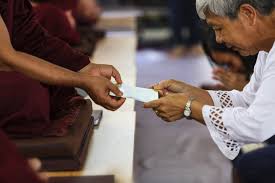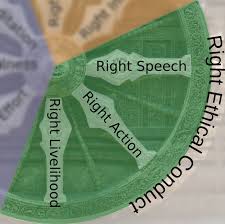Buddhism’s “Ten Good Deeds” or “Ten Wholesome Deeds” are somewhat different and similar to the “Ten Meritorious Acts.” If you become familiar with Buddhism’s “Five Precepts,” then you should be familiar with the Ten Good Deeds. One can consider the Ten Good Deeds of Buddhism to be a subset or a more in-depth explanation of the Five Precepts. The website called Buddhist Door gives a simplistic list of Buddhism’s Ten Good Deeds as: Do Not Kill, Do Not Steal, Do Not Indulge In Sexual Misconduct, Do Not Lie, Do Not Use Double-Tongued Speech, Do Not Use Abusive Speech, Do Not Use Irresponsible Speech, No Greed, No Hatred, and no Delusion. In a sense, this is similar to Christianity’s “Ten Commandments.”
These can be linked to Buddhism’s “Three Poisons,” which are: greed/desire, hatred/aversion, and ignorance/delusion.
The Wholesome Deed
The website of Nalanda University gives an in-depth explanation on each Wholesome Deed.
The first wholesome deed explains that one leaves all killing behind. We are encouraged to be humane to all living things. One can simply see the conflicts in South America, Africa, and the Middle East.
The second wholesome deed is that one, by nature, does not steal. In short, be content with what you have and do not be angry about what you do not have. Do not take from somebody else what you do not have. It explains that Bodhisattva was content with what he had and did not desire what others had.
The third wholesome deed is that one does not engage in sexual misconduct. It explains that Bodhisattva was content with his wife. He did not seek other people’s wives, girlfriends, fiancees, and so forth. He did not have “friends with benefits” nor did he have concubines.
 The fourth wholesome truth talks about the wrongs of lying. Bodhisattva was not one to lie. In this regard, following this wholesome deed gives you much credibility. It makes you incredibly trustworthy.
The fourth wholesome truth talks about the wrongs of lying. Bodhisattva was not one to lie. In this regard, following this wholesome deed gives you much credibility. It makes you incredibly trustworthy.
The fifth wholesome truth explains that we should use speech to bring people together and not split people apart. One can look at modern-day politics in which how people are harshly divided amongst each other.
The sixth wholesome truth explains we should not use speech that is offensive, hateful, hurtful, abusive, and so forth. It rouses up anger, resentment, hate, etc. In short, that type of speech destroys ourselves and other people. This can be grouped with the fourth and fifth wholesome deeds.
The seventh wholesome truth is not using irresponsible speech. In short, be careful what you say when around certain people. Also, it teaches us when to keep quiet and not make matters worse.
The eighth wholesome truth is that we should not succumb to greed. Through greed, we destroy ourselves and hurt others. This is the first of Buddhism’s Three Poisons. It can also be grouped with not stealing, not giving into sexual misconduct, etc.
The ninth wholesome truth is not to give in to anger. Anger is the second of Buddhism’s Three Poisons. By succumbing to anger, we are capable of doing much harm and destruction.
The tenth wholesome truth is to free ourselves from “dark views.” In this respect, this is grouped with the last of Buddhism’s Four Noble Truths. Through this deed, we follow Buddhism’s Eightfold Path.





